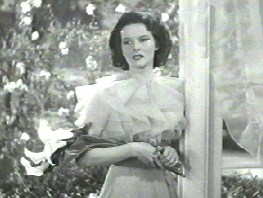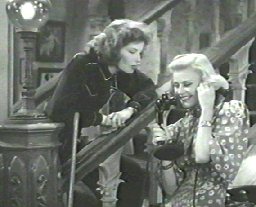Stage Door
  
Stage Door presents the lives of several women in New York, primarily those of Jean Maitland (Rogers) and Terry Randall (Hepburn). All of these women live at the Footlights Club, a boarding house for aspiring actresses. When Randall arrives at the house, she is greeted rather caustically by the other "inmates" for her prim manner and naivete. Soon, however, she manages to reach an uneasy truce with the other girls, mostly because she rooms with, and has been kind to, the less fortunate Jean. Jean is approached by a big-time producer named Powell (Adolphe Menjou) for reasons unrelated to the theater, much to the consternation of his current girlfriend, Linda, who also lives at the club. Jean allows herself to be wined and dined, mostly to watch Linda do a slow burn, but also to take advantage of the free meals and gifts.
As we mentioned before, the film's age can be a barrier. Certainly, there is a great deal of slang that is somewhat incomprehensible. (Can anyone tell us what "go wash your own neck and see how you like it" means? Or the even more obscure "goldfish bowl" insult towards the end of the movie?) Some of the more serious portions of the movie can be mistaken for melodrama as well. Fortunately, the story is suprisingly modern for the 1930's. As our notorious friend Amy pointed out, it's rare to find a movie from this time period that focuses so exclusively on women and their lives and careers. The only major male character (Powell) is a creep, and the women succeed in varying degress, which is better than sending them all home to keep house at the end of their "frivolous" career attempts. All of these women are also funny. The verbal sparring is frequently hilarious, and the characters are drawn well. Even though the majority of the characters are only around for comic relief, all of them have amusing comic ticks, and none of them wear out their welcome. You'll also spot a young Lucille Ball, back when she was still considered a bit of a sexpot. Classic film buffs will probably be enchanted by Stage Door; it's sweet and smart, and showcases some of the era's best actresses. Those of you waiting with baited breath for the next installment of the Friday the 13th series, however, will want to pass. Go wash your own neck and see how you like it.
 Review date: 3/15/98 
This review is © copyright 1998 Chris Holland & Scott Hamilton. Blah blah blah. Please don't claim that it's yours blah blah, but feel free to e-mail it to friends, or better yet, send them the URL. To reproduce this review in another form, please contact us at guys@stomptokyo.com. Blah blah blah blah. |

